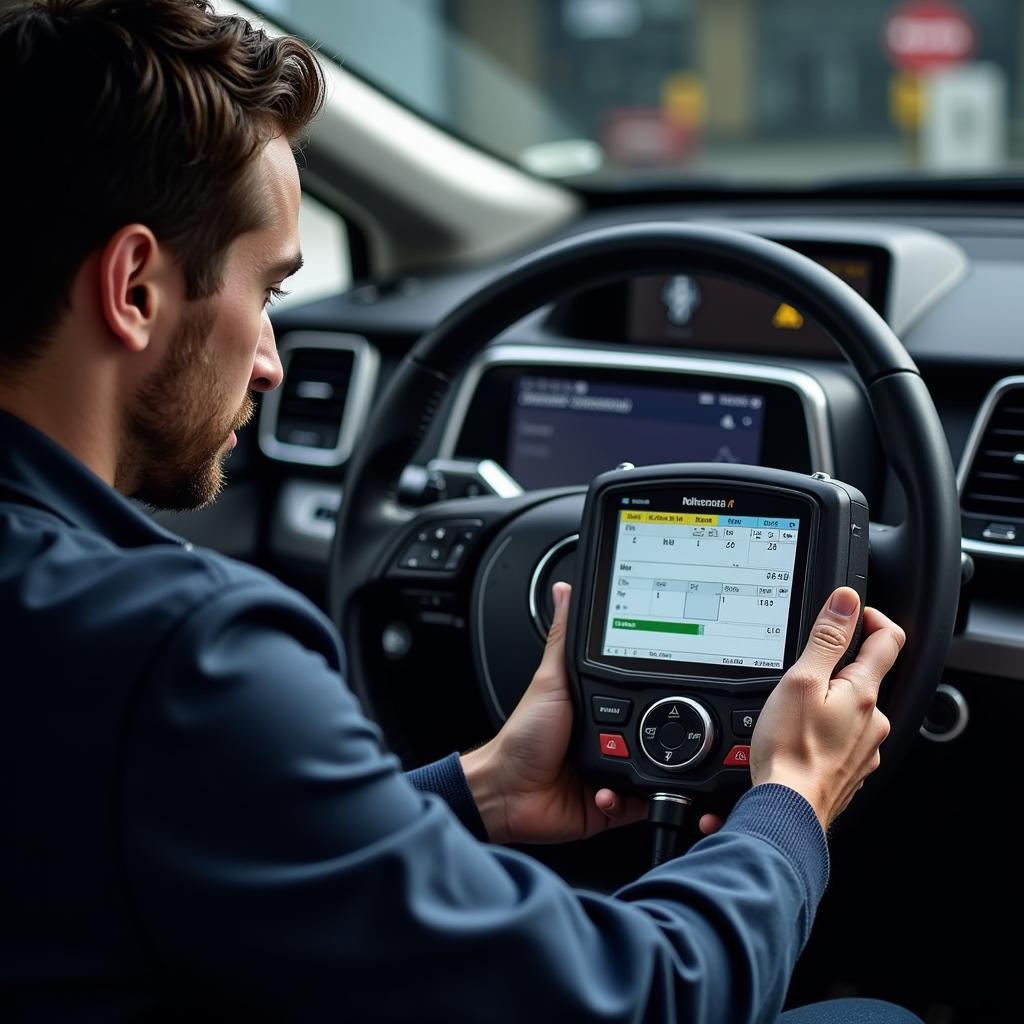Understanding the ins and outs of your car’s health has never been easier with the advent of advanced Car Diagnostic Test Kits. These sophisticated tools empower car owners and mechanics alike to delve into the intricate world of vehicle electronics, identifying issues and ensuring peak performance.
 Car Diagnostic Test Kit in Action
Car Diagnostic Test Kit in Action
What Exactly is a Car Diagnostic Test Kit?
A car diagnostic test kit is essentially a technological bridge that allows you to communicate with your car’s computer system, often referred to as the Engine Control Unit (ECU). This small but mighty device monitors and controls various aspects of your vehicle, from fuel injection and ignition timing to emissions and transmission performance. By plugging a car diagnostic test kit into your car’s OBD-II port (typically located under the dashboard), you can access a wealth of information about your car’s current state and past performance.
Why are Car Diagnostic Test Kits Essential?
Gone are the days of relying solely on a mechanic’s intuition or spending hours troubleshooting a pesky check engine light. Here’s why car diagnostic test kits are indispensable:
- Early Problem Detection: These kits can identify issues in their infancy, often before they escalate into major headaches and costly repairs.
- Accurate Diagnosis: Say goodbye to guesswork. Diagnostic test kits provide specific trouble codes and data readings, pinpointing the root cause of the problem.
- Cost Savings: By diagnosing issues early and accurately, you can avoid unnecessary repairs and potentially save hundreds, if not thousands, of dollars.
- Improved Vehicle Performance: Regular use can help optimize your car’s performance by identifying areas that need attention, ultimately leading to smoother running and better fuel efficiency.
- Empowerment: Knowing what’s going on with your car puts you in the driver’s seat, allowing you to make informed decisions about maintenance and repairs.
Exploring the Different Types of Car Diagnostic Test Kits
The market offers a wide array of car diagnostic test kits tailored to various needs and budgets. Let’s break down the most common types:
1. Basic Code Readers
As the name suggests, these entry-level devices are designed to read and clear basic diagnostic trouble codes (DTCs). They are perfect for DIY enthusiasts looking to get a general understanding of their car’s health.
2. Advanced OBD2 Scanners
These scanners offer a significant step up from basic code readers, providing access to a broader range of data, including live sensor readings, freeze frame data (a snapshot of the engine’s parameters when a fault code was stored), and manufacturer-specific codes. They often come with additional features like graphing capabilities and emissions readiness checks.
3. Professional-Grade Diagnostic Tools
These comprehensive systems are the gold standard for professional mechanics and serious DIYers. They boast advanced functionalities like bi-directional control (allowing you to interact with and test individual components), programming capabilities, and access to extensive repair databases.
Choosing the Right Car Diagnostic Test Kit
Selecting the ideal car diagnostic test kit depends on your specific needs, technical expertise, and budget.
- Casual User: A basic code reader or a budget-friendly OBD2 scanner is more than sufficient for reading and clearing codes, checking emissions readiness, and monitoring basic engine parameters.
- DIY Enthusiast: An advanced OBD2 scanner with live data streaming, freeze frame data, and graphing capabilities will satisfy your thirst for detailed vehicle information and troubleshooting.
- Professional Mechanic: Professional-grade diagnostic tools are essential for in-depth diagnostics, bi-directional control, module programming, and access to comprehensive repair information.
Maximizing Your Car Diagnostic Test Kit: Tips and Tricks
- Read the Manual: It may sound obvious, but taking the time to understand your specific kit’s features and functionalities is crucial for optimal use.
- Regular Check-Ups: Don’t wait for the check engine light to illuminate. Integrate regular scans into your car maintenance routine for early problem detection.
- Record Keeping: Keep a log of any codes you encounter, along with the date and any repairs performed. This historical data can prove invaluable for future troubleshooting.
- Research and Resources: The internet is your friend. Numerous online forums, databases, and communities can provide insights into specific trouble codes and repair guidance.
- Professional Assistance: If you encounter a code or issue that leaves you stumped, don’t hesitate to seek help from a qualified mechanic.
Investing in Your Car’s Well-being
Car diagnostic test kits have revolutionized the way we approach vehicle maintenance and repair. By providing a window into the inner workings of your car’s computer system, these tools empower you to take control of your car’s health, saving you time, money, and potential headaches in the long run. Whether you’re a casual driver or a seasoned mechanic, there’s a car diagnostic test kit out there waiting to unlock a deeper understanding of your vehicle.

Leave a Reply